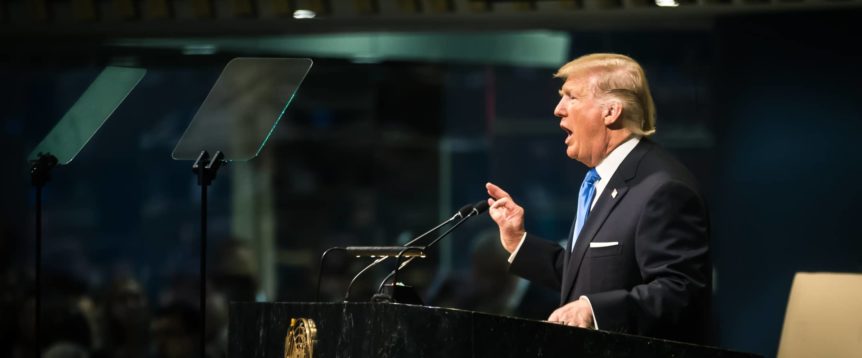Mary Trump, niece of President Donald Trump, has sued the President and his siblings in New York State Court. She claims the siblings concealed the true value of the Trump Family wealth, depriving her of substantial inheritance. The lurid details have put New York Probate issues front and center this election season.
If you read our blog, you know we never pass up an opportunity to discuss New York Probate matters. This story is on a tee for us. Today, we take our hack, diving into some of the legal issues and hopefully imparting some cautionary lessons.
Background
Mary Trump was a legal minor when her father, Fred Trump Jr., died in 1981. She inherited a stake in Trump Family businesses upon her dad’s death. She alleges in her Complaint that the Family installed a Trustee to watch over her interests. Now, Ms. Trump alleges her Trustee “acquiesced [to the President and his siblings’] campaign to squeeze her out of the family business entirely.”
In sum, Ms. Trump claims her Trustee doubled as an advocate for the President and his siblings. Specifically, she alleges the siblings and her Trustee conspired to siphon money from companies in which she held a stake, to entities created and owned by the siblings and the Trustee.
She also alleges the siblings and her Trustee surreptitiously conspired to cause her grandfather to change his Will when he was suffering from Alzheimer’s. She claims the new Will stripped her executor powers and substantially diminished her inheritance.
After her grandfather passed, Ms. Trump contested the revised Will in New York Surrogate’s Court. She eventually settled her case with the President and his siblings.
Now, Ms. Trump claims she learned the settlement was based on misinformation. She alleges fraudulent concealment and devaluation of assets by the siblings and her Trustee. She also claims that the siblings forced her to sign a settlement under significant duress. Finally, she alleges that the Probate attorney who advised her was a cohort of the two-timing Trustee.
All of this reads like a bad soap opera. Though, you should consider that the allegations in a complaint are only allegations, meant to cause maximum legal and political impact. However, through these salacious details, we see a great opportunity to discuss a few key New York Probate and Estate issues.
A Good Guardian is Critical
A Guardian Ad Litem (GAL) is someone a judge assigns to help a person who cannot come to court or protect their own rights and interests. Thus, a GAL is usually appointed in Probate cases involving minor beneficiaries. GALs are only responsible for helping children resolve a specific court proceeding. They do not continue to act on behalf of the child after Probate is complete.
It’s not clear from the Complaint or reporting whether Mary Trump’s father died with a Will or without a Will in 1981. But, during a New York Probate or Administration proceeding, you can be sure that the Surrogate’s Court appointed a GAL.
The GAL’s primary duty would have been to ensure young Mary Trump received a fair share of her father’s interest in the Family businesses. This would necessarily mean obtaining and diligently examining company financials. That information could have put the child on equal footing with her aunts and uncles from the start.
Another duty of the GAL would have been to select or vet any Trustees appointed to represent the child in the Family businesses. Perhaps a diligent GAL would have recognized that the Trustee was also a personal lawyer for other family members. At the very least, a good GAL should have been suspicious of a Trustee allegedly advanced by the very persons whose interests were adverse to the child.
Most of us have a hard time imagining our aunts and uncles as our “adversaries.” But, in many New York Probate and Estate proceedings, that’s exactly what they are. And, child beneficiaries can be the most vulnerable targets, making a GAL a crucial figure.
Executors are Fiduciaries of the Heirs
A fiduciary is a person who agrees to act in the best financial interests of another. Executors under a Will are one example of a fiduciary. Executors have a duty to act in the best interests of the estate and its beneficiaries. They can face legal liability if they fail to meet this duty, such as when they put their own interests first.
Mary Trump’s grandfather made the President and his siblings Co-Executors under his Will. Even putting aside the fact that Ms. Trump was much younger than her aunt and uncles, her status as a beneficiary meant that the President and his siblings, as Co-Executors, had a duty to put Mary’s interests above even their own.
Ms. Trump claims that the siblings committed textbook breaches of fiduciary duties. If she can prove that they knowingly misrepresented values and hid assets during probate, or siphoned funds and conspired to reduce her inheritance, she might win damages.
Ms. Trump also claims she only learned of the breaches from a New York Times article many years after probate ended. Sadly, those of us who are not members of a high-profile family usually never learn of such breaches. Beneficiaries do not have access to records like Executors. Thus, they are mostly in the dark during probate.
That’s why we’ve previously written about the importance of beneficiaries having their own attorneys, separate and apart from the attorneys for the Estate and its Executors. Which leads us to our next issue…
The Estate’s Attorney is Not Your Attorney!
New York courts have repeatedly held that attorneys of an estate or its executors do not also represent the interests of beneficiaries. Yet, we are still surprised at how few beneficiaries are aware of this basic rule.
Indeed, it’s easy to assume that dear old grandpa’s attorney has only your interests at heart. After all, you were the apple of grandpa’s eye. But, the cold truth is that the person who hired and paid the attorney has passed away, and now, only the Executor has the power to fire or pay the lawyer. Where do you think the attorney’s loyalties lie?
Luckily, there are a number of legal maneuvers a beneficiary’s attorney can make. This might include demanding accountings, issuing subpoenas, compelling distributions or partitions, and conducting examinations under oath.
Ms. Trump claims she was deprived of those opportunities. She believes a double-crossing Trustee induced her to hire a Probate Attorney who was aligned with her adversaries. Don’t end up like Mary Trump. If you are a beneficiary under a Will, or an heir of someone who died without a Will, consult your own, independent attorney.
Wills Require Testamentary Capacity
Mary Trump claims that her grandfather lacked “testamentary capacity” when he signed a “codicil” allegedly prepared by the Trump siblings and the Trustee. (A “codicil” is simply a legal instrument created to modify an existing Will).
In New York, the proponent of this argument has the burden of proving that the “testator” (the person leaving the property) lacked mental capacity. The Probate Court will consider the following factors.
- Whether the testator understood the nature and consequences of executing a will;
- If the testator knew the nature and extent of the property they passed via their will;
- whether the testator knew the person to whom they were passing their property; and
- the relationship between the testator and the person who received the property.
Importantly, courts measure capacity by examining the moment the testator Will or codicil was executed. So, even if the testator had many months of dementia, the Court might find testamentary capacity if he had a moment of clarity when he executed the document.
Here, Mary Trump alleges that her grandfather suffered from Alzheimer’s Disease. It is important to note that Alzheimer’s is a medical diagnosis, while the above is a legal test. So, while there is certainly some overlap, and the existence of a medical diagnosis can inform the Court, it will not in and of itself prove testamentary capacity.
Don’t Wait Too Long
One of the first hurdles Mary Trump is likely to face is the argument that she waited too long to sue. After all, Fred Trump, Sr. died in 1999 and his estate was settled in 2001.
In New York, the time to object to Probate generally expires if you don’t appear when you receive notice of the proceeding. Ms. Trump did timely appear and object, twenty years ago. Then, she received a cash settlement in exchange for a release agreeing to drop all objections and settle probate.
Putting aside the issue of whether an agreement was made under duress or fraud, Donald Trump’s attorneys are likely to argue that too much time has passed. They will say that financial records are long gone and that key witnesses (like the Trustee) are dead. They will probably argue that Ms. Trump had years to discover any alleged irregularities. They will claim the delay has prejudiced the defense.
Ms. Trump probably knows the Estate is considered settled, so she is making novel claims to avoid re-litigating in Surrogate’s Court. She is now framing the issues as Fraud and Breaches of Fiduciary Duty.
This last issue will likely turn on whether the Court agrees that the 2018 N.Y. Times article constitutes new evidence upon which Mary Trump can sue. Even then, courts are generally reluctant to revive claims this old.
The lesson here, as always, is beneficiaries should consult independent, qualified Probate and Estate counsel as soon as possible, if they even suspect Executor malfeasance.
Disclaimer:
The information on this website is not legal advice. It is for information purposes only. No user of this site should act or refrain on the basis of this information without seeking legal counsel. This website does not create an attorney-client relationship. Photo 103678021 © Palinchak | Dreamstime.com

